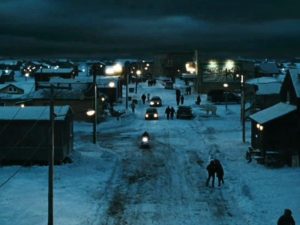Warning: this film contains depictions of suicide, which are discussed in this review.
Center Stage, director Stanley Kwan‘s unusual but undeniably brilliant depiction of the life of silent film star Ruan Lingyu, begins with a series of stills of the actress from her earliest films when she was only 16. Many of these films are no longer available and deemed lost—a misfortune all too common to early cinema. But when one considers how short and sad Ruan‘s life was, the tragedy of knowing how few of her films we have access to today is greatly compounded.
On March 8, 1935, Ruan committed suicide at the age of 24 with an overdose of barbiturates. Her death echoed the fate of one of the final characters she portrayed onscreen—a character whose tragic end was inspired by the recent suicide of another young actress—and sent shock waves through the Chinese film industry. It also highlighted the viciousness of the Chinese tabloids in their treatment of these young stars, tearing apart the imperfections of their private lives as punishment for daring to embody the trials and tribulations inherent in being a modern woman.
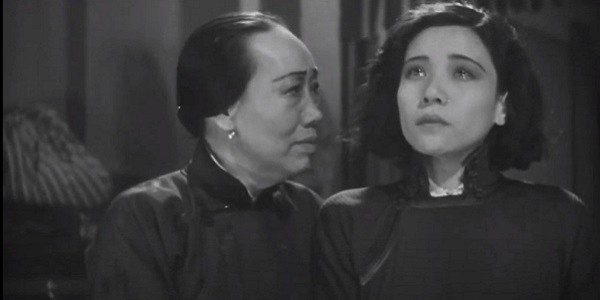
Released in 1991, Center Stage combines archival footage of Ruan with scenes of her life and career being given the traditional biopic treatment, interviews with those who worked with her, and behind-the-scenes footage of the cast and crew discussing their attempt to pay tribute to Ruan. The result is a complex, unconventional film befitting the many-layered legacy of its subject. To mark its 30th anniversary this year, a gorgeous new 4K restoration of Center Stage is being screened virtually via Metrograph; it is a must-see for anyone interested in cinematic history, both for ensuring that the legend of Ruan Lingyu lives on and for featuring an iconic performance from another actress who has since achieved legendary status, Maggie Cheung.
Cinematic Revolution
If you’ve watched any of Ruan’s films—and fortunately, many are accessible via the University of British Columbia’s Chinese Film Classics portal—you can easily understand why she earned the nickname “the Chinese Garbo.” Like that Swedish star (whose career also ended early, with her retirement at age 35), Ruan‘s striking beauty, intense charisma, and undeniable talent made her the kind of movie star who practically leaps off the screen while you are watching her. Her performances are far more nuanced than one often expects from the silent era; her more modern acting style was a perfect fit for the roles that she embodied during the latter part of her career when she began collaborating with left-wing directors on films that were critical of Chinese society, particularly its treatment of women.
Center Stage focuses primarily on this part of Ruan‘s life, in which Ruan (played to perfection by Cheung) strove to take part in the revolutionary activity that was swallowing up Shanghai at that time not by taking to the streets, but to the screen. She fights to prove herself to the directors at the studio, wiping off her makeup and trading her glamorous cheongsams for the more practical wardrobe of the working class to prove that she could indeed embody a rebellious factory worker in Three Modern Women (1932).
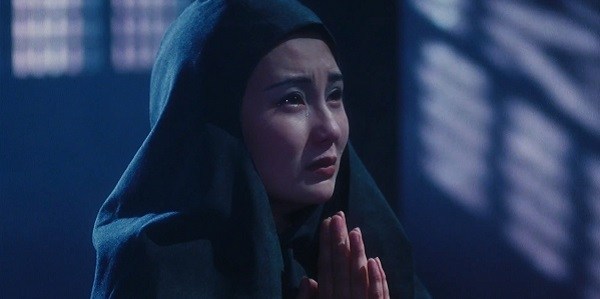
No matter the role, Ruan is a perfectionist, insisting on additional takes of even the most arduous scenes if she personally feels she did not do a good enough job. And despite fighting for meatier roles than portraying just another tragic, pretty face, she also embraces her natural sensuality, noting that people compare her to Marlene Dietrich because she is sexy when playing a woman in distress. Indeed, Ruan knew that her considerable beauty need not prevent her from realistically embodying a traditional toymaker living in a rural village in Little Toys (1933) or a prostitute working the streets in order to get her young son an education in The Goddess (1934), one of her final roles and quite possibly her greatest.
Yet as Ruan‘s star rises, her personal life becomes more and more of a mess, with her offscreen life echoing the melodrama her characters often suffered through onscreen. Tired of financially supporting her childhood sweetheart-turned-husband Zhang Damin (Lawrence Ng) and his gambling addiction, Ruan files for divorce and begins an affair with a tea tycoon, Tang Jishan (Chin Han). Soon Ruan, her mother, and her adopted daughter all move into a home with Tang, despite him having a wife and other mistresses elsewhere. But Zhang’s jealousy and need for money lead him to file a very public lawsuit against Ruan, which the tabloids seize upon in order to defame her character.
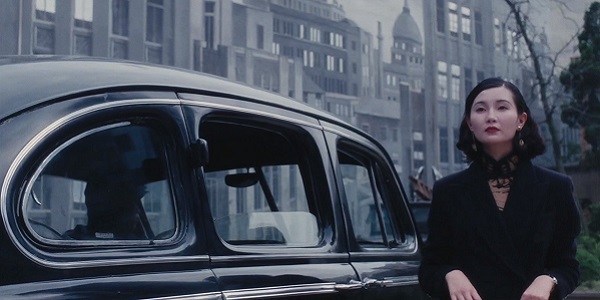
The tabloids have a reason for targeting her: Ruan is about to star in New Women (1935), which loosely dramatizes the life and death of Ai Xia, a left-wing screenwriter and actress who committed suicide at age 21 following media rumors about her personal life. Director Cai Chusheng (Tony Leung Ka-fai) sees New Women as both a tribute to Ai and a personal act of revenge on the media, but the controversy surrounding the film and the media’s fury at their depiction in it ignites a firestorm of negative media attention directed at Ruan that contributes in no small part to her own death.
The Marvelous Maggie Cheung
Center Stage features scenes of Cheung acting out many of Ruan‘s most famous roles alongside footage of Ruan herself where that still exists. The parallels are astounding, for Cheung looks quite a bit like Ruan and embodies these characters with the same deep empathy that Ruan originally brought to the roles. But Cheung‘s most stellar work in the film is her portrayal of Ruan off-camera, as an intelligent, sensitive, and surprisingly strong woman who lived at the forefront of change in both the Chinese film industry and society at large.
In one of the film’s final scenes, at a party held earlier in the evening the night she died, Ruan celebrates the recent installation of sound recording technology at the studio, announcing that she’s looking forward to being the first actress to speak Mandarin onscreen (even if it means the native Cantonese speaker will have to brush up on that dialect). Yet even as she appears to be looking to the future, she also gives what ends up being her final farewells to her colleagues, reminiscing with each one in turn about the films they’ve made together. Ruan, dressed to the nines with a cocktail glass casually dangling from her hand, grows increasingly introspective as she makes her rounds of the table, her laughter tinged with sadness but her bright smile never fading, yet another brilliant performance put on for the benefit of her filmmaker friends. It’s an extremely poignant moment, made all the more so by Cheung‘s delicate performance; like Ruan, she is capable of emotional devastation with the mere twitch of a lip or flutter of an eyelid.
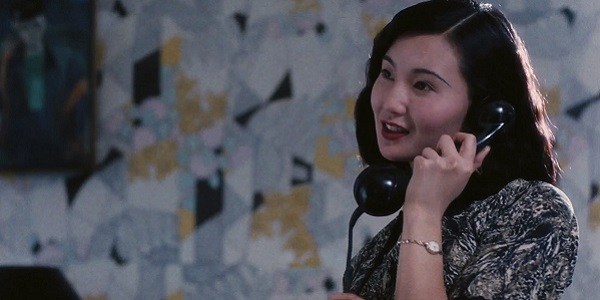
Center Stage was shot on 35 mm film in lush color, with a modern aspect ratio; only the archival footage and some of the behind-the-scenes sequences are in black-and-white. I personally prefer this style of dramatizing film history rather than failed efforts to mimic the era’s style that don’t go far enough to feel truly authentic. (Yes, I’m talking about Mank) Kwan and his collaborators know that one doesn’t need to resort to such lazy visual signals as CGI cue marks in order to pay tribute to early cinema. Every detail of the scenes set in the 1930s, including those that take place on the set of film productions, is absolutely gorgeous to look at, from the rich contrasting colors of Poon Hang Sang‘s cinematography to the period costumes designed by Lai Pan to the glamorous decor of the homes and cafes that Ruan and her friends frequent. The colors and patterns of Ruan‘s cheongsams often clash with that of the wallpaper she’s photographed in front of, but in a way that only adds to the film’s sheer beauty—something that is further emphasized by the quality of this new restoration. The result is a film that is never not a joy to look at over the course of its nearly three-hour running time.
Disappearing Stars
Watching Center Stage today, one cannot overlook the bittersweet irony in Ruan being played by Cheung, another renowned actress whose career has run a similar arc, albeit with a much less tragic ending. As Kwan explains to Cheung at the beginning of the film, Ruan started out in a series of light roles in romances and martial arts movies before taking on a series of more serious roles. Hearing this, Cheung, whose first rose to prominence as Jackie Chan’s much put-upon girlfriend in the Police Story movies before taking on more serious roles with filmmakers such as Wong Kar Wai, breaks into a smile: “We share similar fates then!”
Kwan continues, “Ruan killed herself over half a century ago, but people still remember her as a movie star. Maggie, would you want to be remembered half a century later?” Cheung replies, “That’s not so important to me. But, if people do remember me, it will be in a different light than Ruan. She ended her career at its pinnacle, and now she’s a legend.” Yet only thirteen years after the release of Center Stage, Cheung too would end her career at what seemed to be its peak, after winning the Best Actress Award at Cannes for her role in Olivier Assayas‘ Clean.
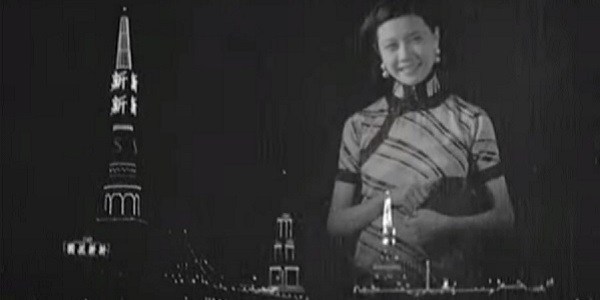
Following the release of Clean in 2004, Cheung effectively retired from acting in favor of other pursuits; she has since appeared only sporadically in cameo roles, the last of which was in 2010. Watching her deeply moving portrayal of Ruan in Center Stage, one is reminded of how much we are missing by not having the privilege of seeing Cheung in more movies today. At one point in Center Stage, someone poses the question, “Is it advantageous for a movie star to vanish at the peak of her brilliance?” Perhaps for the movie star, but not for the audience.
Conclusion
One hopes that this new restoration of Center Stage reignites interest not just in the film, which is an absolute masterpiece in its own right, but in the life and career of Ruan Lingyu, and the way the media uplifts talented young women only to then gleefully tear them down. It’s not just Ruan‘s work that feels strikingly modern, but also the tragedy of her death. That tabloids are still making money by destroying the reputations of women as soon as they dare reveal their imperfections is not just an indictment of them, but of all of us for allowing it to continue to happen nearly a century after Ruan‘s death.
What do you think? Are you familiar with the roles of Ruan Lingyu? Share your thoughts in the comments below.
The new 4K restoration of Center Stage is screening online via Metrograph beginning March 12, 2021.
Watch Center Stage
Does content like this matter to you?
Become a Member and support film journalism. Unlock access to all of Film Inquiry`s great articles. Join a community of like-minded readers who are passionate about cinema – get access to our private members Network, give back to independent filmmakers, and more.
Join now!



